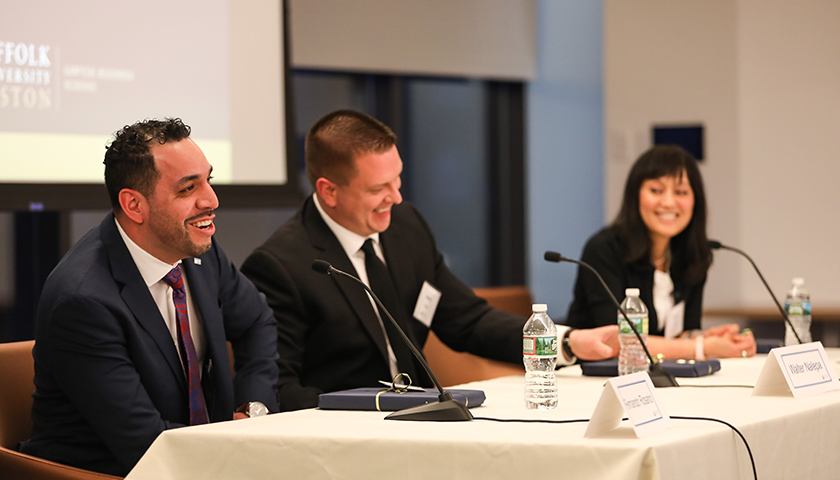Career Advice From Tax Professionals

Taxes, as Boston native Benjamin Franklin opined, are a certainty in life.
Tax laws, however, can be a source of huge uncertainty. That’s especially true this year with the sweeping changes Congress has enacted.
But at a recent forum co-sponsored by the Suffolk Master of Science in Accounting (MSA), Master of Science in Taxation (MST), and Wiley CPAexcel, a panel of seven tax professionals sounded upbeat about the profession. Yes, the new tax laws have everyone scrambling. But the consensus was that the tax and accounting fields continue to offer almost unlimited opportunities for students entering the workforce.
The forum featured seven panelists, many of whom are Suffolk alumni. Representing the Big Four firms, smaller firms, the IRS, and everything in between, the panelists brought a wealth of advice and anecdotes to the 100 or so Sawyer Business School students and faculty in attendance. Here are some issues that were discussed.
Is Now the Time to Study Tax?
The answer up and down the table was a resounding “yes.” Matt Davis, MBA/MST ’08, a tax partner at PwC who also teaches at Suffolk, said that because taxation has become so complicated, clients more and more need people who can “connect the dots” and see the big picture.
What can students expect as a new accountant or tax preparer
Tax Director Roxanne Emond, MSA ’06, answered with a riddle: “‘Why did the accountant cross the road? Because it’s what she did last year.’ But that no longer applies,” she said. Students need to understand the old laws and the new laws and be able to adapt to the ever-changing landscape.
What Do Students Need to Succeed?
“You have to be comfortable with technology,” said Fernando Rosario, MBA/MST ’13, a senior tax associate for high-net-worth clients. “Tax software is constantly changing. You have to keep up. And the fundamentals are still really important, too. Learning Excel. Understanding the concepts.”
Walter Nalepa, a duly sworn IRS special agent—a self-described “tax cop”— echoed the thought. “Writing skills are very important,” he said. “Excel skills, too. Being able to break down lots of data into usable values.”
“Learn how to do more than one thing,” advised Angela Chai, MST ’08, a corporate international tax manager at Eaton Vance Management. “Be able to do the accounting, the financial statement audit, the corporate tax return. Learn the whole cycle.”
What About All the Long Hours and High Stress?
All the panelists acknowledged that, especially heading toward April 15, the job can take a toll. But Hugues Marcelin, MST ’16, and founder of Boston Tax Masters had a simple answer, “It’s the love of the industry that keeps you going.”
Contact
Greg Gatlin
Office of Public Affairs
617-573-8428
Ben Hall
Office of Public Affairs
617-573-8092



